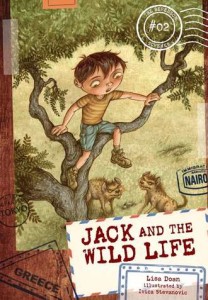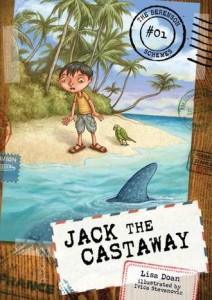Lisa Doan knows funny! She’s been in a few funny situations herself, being an avid traveller. She’s the author of the hilarious middle grade series The Berenson Schemes: Jack the Castaway, Jack and The Wild Life, and coming in March, Jack at the Helm. The books feature the ever-responsible and practical Jack, and his globetrotting and wacky parents, Richard and Claire.
Berenson Schemes Book Giveaway! Leave a comment and you could win signed copies of Jack the Castaway and Jack and the Wild Life.
We caught up with Lisa to see how she creates these jaw-dropping adventures.
FLH: Poor Jack! His parents are always leaving him behind in outrageous situations. How did you come up with the idea for the Berenson Schemes?
LD: First, I read an article about helicopter parents, which I thought was hilariously creepy. Then I noticed that in America, we seem to have two extremes – kids who are running around with no supervision at all, and kids who have parents who do their homework for them. (Because, you know, if the kid doesn’t get into an Ivy League school, life is OVER.) Then, as I was mulling over the sad state of parenting in America, it occurred to me that perhaps this was none of my business because I was not a parent. Then it occurred to me that if I were a parent, helicoptering would not be my strong suit and my kids would barely make it into community college. And that is assuming I didn’t lose them somewhere first. I could envision how I might lose track of the little buggers and then I’d be cleaning out a closet and thinking, “I don’t remember ever wearing shorts this small. Wait a minute. There was a girl here who wore those shorts. Where the heck did she go?” So then I thought, wouldn’t it be funny to have a helicopter kid saddled with parents who may or may not resemble myself.
FLH: What’s your process for coming up with Jack’s parents’ get-rich-schemes and Jack’s predicaments?
LD: My backpacking definitely inspired the get-rich-quick schemes. Expatriates are an enterprising lot, and in Jack the Castaway starting a snorkel business wasn’t such a bad idea, had they known anything about boats or snorkeling. And, of course, to miss the key ‘filling the boat with gas’ step and then decide to have their landlubber son drive the boat could only go wonderfully wrong.
 For Jack and the Wildlife, I actually thought their idea wasn’t that bad. In theory. They could build a Maasai tourist camp on the cheap, for the reasons they noted – no plumbing needed, no electricity, no kitchen. Really no anything except four walls. Naturally, they did miss some key details – like, you can’t just pick a spot in a game reserve and start building, but they never got far enough into the plan to find that out.
For Jack and the Wildlife, I actually thought their idea wasn’t that bad. In theory. They could build a Maasai tourist camp on the cheap, for the reasons they noted – no plumbing needed, no electricity, no kitchen. Really no anything except four walls. Naturally, they did miss some key details – like, you can’t just pick a spot in a game reserve and start building, but they never got far enough into the plan to find that out.
The third book, Jack at the Helm, was a little bit different. I had spent time in Nepal, but that wasn’t why I chose it. I chose it because of the symbolism. Nepal is primarily Hindu and Buddhist and eastern religions teach acceptance. Jack had to realize that he was never, ever going to reform his parents. Modify their behavior slightly – maybe. But like real life, people are who they are. Jack comes to accept what he cannot change, and in that way, finally comes up with a plan everybody can live with. (And stay alive with). So for that one it seemed natural that they would scheme to start their own religion. After all, they are the Berensons – they always think big.
 FLH: If your travels inspired ideas, can you give us examples of how your real-life traveling sparked an idea for a scene?
FLH: If your travels inspired ideas, can you give us examples of how your real-life traveling sparked an idea for a scene?
In Jack and the Wildlife, it might seem improbable that Jack finds himself alone on the Masai Mara, but it isn’t really so farfetched. I once traveled to the north of Kenya and my guidebook noted that there was a small game park that could be toured on foot or bicycle. I should have read ‘on foot in a game park’ and realized that was about the stupidest idea I had ever heard. As it was, I rented a bike, got lost in the reserve, I even stopped and sat down for a while to rest in a wooded area, then I soldiered on figuring I had better find the entrance before dark, then a jeep zoomed by and a guy hanging on the back shouted “Have you seen the leopard,” and sped off before I could ask for a ride. Why am I not dead? On the upside, that’s the kind of adventure that Richard and Claire Berenson would be proud to call their own.
FLH: One of my favorite characters is Seldie in JACK THE CASTAWAY. I wanted to hang out with her. How did she come about?
LD: Seldie is based on my Caribbean landlady, Ms. Mercele Connor. She is a wise woman who never allows anything to shake her up too much. One time I came up on her porch and there was a neighbor’s chicken there who had decided to roost. I would have begun immediately making plans to drive it off. Mercele looked at it and said, “Well, baby, it’s just tryin’ to live,” then sat down with her coffee and the chicken. Mercele is a master at rolling with life’s unexpected events. I wanted a character that temperamentally fell between Jack’s parent’s complete disregard for danger, and Jack’s extremely risk-adverse nature. The idea behind these stories is about managing risk – what’s too much and, the question asked less often, what’s not enough.
Thanks, Lisa!
Come back for part 2 of Lisa’s interview on Wednesday. In the meantime, leave a comment, tell us what tickles your funny bone, and you could win signed copies of Jack the Castaway and Jack and the Wild Life. Good luck!
Frances Lee Hall earned her MFA in Writing for Children and Young Adults from Vermont College of Fine Arts and writes middle-grade fiction for young readers. Find her at www.francesleehall.com and on Twitter @fleehall











This is one of the best author interviews I have ever read! I loved reading about Lisa’s personal life and adventures and the ways they influenced her plot and characters, and it was so helpful to read about her quite logical decisions/thought patterns in creating her VERY wacky characters.
So glad you liked it, Barbara! Thanks for stopping by.